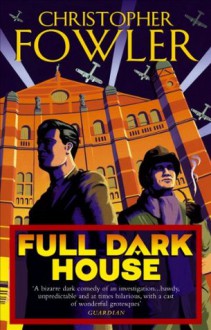
The premise behind this book was intriguing: a Peculiar Crimes Unit, set up during the Blitz quietly to handle crimes that might undermine civilian morale, leaving lots of room for Mulder-meets-British-stiff-upper-lip humour.
The Unit is led by Bryant: an eccentric, ostentatiously intuitive, tactless, scarf-wearing, driven twenty-two-year-old who is more comfortable with exotic books than with ordinary people. His newly-hired first-day-on-the-job side-kick is the enthusiastic, scientifically-minded, charming, good-looking nineteen-year-old May, brought in as a detective despite his lack of experience because all the experienced people have left to fight the Germans.
The overall effect was that of a frenetic young "Dr Who" meeting "Endeavour".
I liked the spirit of it. It would make great television. It didn't hold my attention as a book.
The opening, in London in the 1990s when Bryant and May are still serving officers although they are both beyond the normal retirement age, didn't quite work for me. It asked me to care too much about characters I'd barely met. I had no context and so didn't get the emotional impact of the devastating fire-bomb.
Once the story flipped to London during the Blitz it hit its stride. The writing was strong on visuals, a little predictable on dialogue and way out there on the weirdness of plot.
The problem I had was that this retrospective visit to London felt a little too cosy and too nostalgic, a feeling that was amplified by the "Mystique of the Theatre" riff. The murder was surprisingly gruesome but carried little emotional impact.
I abandoned the book when my irritation with the changing points of view, sliding timelines and self-consciously look-how-clever-but-quaint-we-were-back-then technology innovations overwhelmed my interest in who had what to whom and why.
I'm sure many people will enjoy this. Maybe I'd have ridden with it more easily if there was an all-cast audio version but the text by itself didn't hold me.

 Log in with Facebook
Log in with Facebook 







